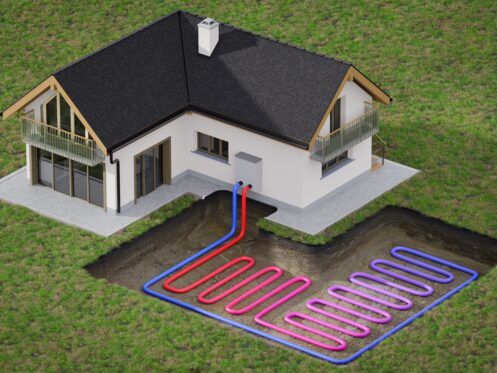While St. Louis winters can be quite chilly above ground, it’s a different story underneath your feet. Deep underground, the temperatures stay fairly warm throughout the year. If you can access that warmth, you can use it to heat your home. That’s the concept behind geothermal heating, an approach to home comfort that offers multiple benefits.
1. Energy Efficiency
Geothermal receives praise for the incredible energy efficiency it provides. This method of heating relies on heat pump technology. As a whole, heat pumps are efficient heating systems. They warm a home by moving warmth from the outdoors into your home.
Many heat pumps draw heat from the outdoor air. Geothermal heat pumps are even more energy efficient than those that source heat from the air. That’s because the temperature underground stays pretty consistent no matter the season. Even on 10-degree days, it may still be about 50 degrees Fahrenheit down deep in the soil.
Unlike furnaces, geothermal pumps don’t have to generate heat. Rather, they simply transfer the underground heat that already exists into your home. As a result, geothermal heating systems are significantly more energy efficient than even the most highly rated furnaces.
2. Lower Operational Costs
The more efficient an appliance is, the less power it requires for operation. An energy-efficient geothermal heat pump requires no natural gas and only a small amount of electricity. Lower energy use leads to reduced utility bills.
The savings that you see in your fuel bills can help you recoup the cost of installing a geothermal system. You may find that it doesn’t take too long to offset your initial investment cost.
3. Environmentally Friendly
Energy efficiency has environmental benefits as well as financial ones. When you choose an efficient heating system, you can feel satisfied that you’re doing your part to protect the planet.
In addition, since geothermal heat pumps run on electricity rather than natural gas, they don’t require the burning of fossil fuels. They allow you to heat your house without producing large amounts of carbon emissions that may contribute to global warming.
4. Multi-functionality
Geothermal heat pumps are invaluable for heating a home in the winter, but that’s not all they can do. Heat pumps can cool your home as well. You can use your geothermal system in place of a traditional air conditioner. Your energy-efficient HVAC operation can, therefore, continue throughout the year.
A heat pump’s cooling mode is the opposite of its heating mode. Instead of moving heat from outside to inside, the appliance draws excess heat out of the indoor air and transfers it underground. Doing so cools down your house so that you will stay comfortable even on the hottest days.
Not only that, but the unit can also heat water. Instead of delivering the reclaimed heat into the ground, a geothermal system can use a desuperheater auxiliary heat exchanger to divert the heat to your hot water tank for your laundry and showers. This hot-water capability works during all seasons.
5. Improved Comfort
When you run a gas furnace, it operates in cycles. For a few minutes, it puts a heavy blast of heated air into your rooms. Then, the unit shuts off again until the thermostat drops low enough to kick on another round of heating. You may start to get a little chilly whenever the furnace is in its rest mode. Geothermal units put out warm air in a more consistent fashion. Many homeowners find that approach to heating preferable.
In addition, furnaces have a reputation for producing dry air that can cause respiratory troubles and skin irritation. Heat pumps don’t have the same drying effect. When you use a geothermal system, your nose, throat and hands may feel the difference.
6. Space Savings
With an HVAC setup that includes a furnace and an air conditioner, there are multiple parts involved. Outdoors, you have a compressor. Plus, both a furnace unit and an air conditioning unit sit indoors. Altogether, those components can take up a lot of space.
Geothermal systems don’t require as much floor space. There’s no outdoor unit and only one indoor component, the heat pump. The system also includes ground loops, but since those are buried outside, you won’t ever see them.
7. Reduced Noises
Running a traditional furnace can be a bit noisy. While a furnace that’s in proper working order shouldn’t be overly loud, you are still likely to notice whenever it kicks on and off. Geothermal heat pumps are much quieter.
Also, there is no outdoor compressor as there is with a traditional air conditioner. You will be able to enjoy quiet summer evenings in your backyard without the interruption of the AC’s loud hum.
8. Safe Heating
With a traditional furnace, there’s always a risk of carbon monoxide poisoning. The combustion process produces this dangerous gas. If there’s a problem with your furnace, the carbon monoxide could leak into your house.
You won’t have to worry about that with geothermal heating. Since this type of system doesn’t rely on combustion to produce heat, there’s no carbon monoxide involved.
9. Tax Credits
Because of geothermal heating’s benefits, there are often incentives to install this type of system. You may be eligible for a tax credit if you decide to invest in geothermal. This can help you recoup the costs of installation even more quickly than you would otherwise.
The availability of tax credits may vary from year to year and depending on where you live. You can ask your geothermal professional whether any tax incentives are currently available in your area.
10. Impressive Life Span
Unlike an air conditioner compressor that sits outside throughout the year, geothermal heat pumps are protected from the elements. That means that they usually last longer than traditional heating and cooling systems.
In general, air conditioners are often good for 15 years. You may get closer to 20 years out of a standard furnace. A geothermal system, on the other hand, can last for years longer. The looping system, which is the underground portion of the system, may stay in proper working order for 50 years. The heat pump portion may need to be replaced after 20 or 25 years.
Considering that many people have their geothermal systems running for the majority of the year — in both summer and winter — that’s an impressively long life span!
Level 9 Heating, Cooling, and Plumbing is your source for heating and cooling services in the Washington and St. Louis areas. We are experts in geothermal heating, and we’re also well-versed in caring for traditional air conditioners and furnaces. Our team specializes in both residential and commercial HVAC. You can count on us for indoor air quality and plumbing care as well. We’ve been serving the area for nearly five decades and look forward to becoming your trusted source for HVAC and plumbing expertise.
Reach out to Level 9 Heating, Cooling, and Plumbing today to learn more about geothermal heating in St. Louis!



